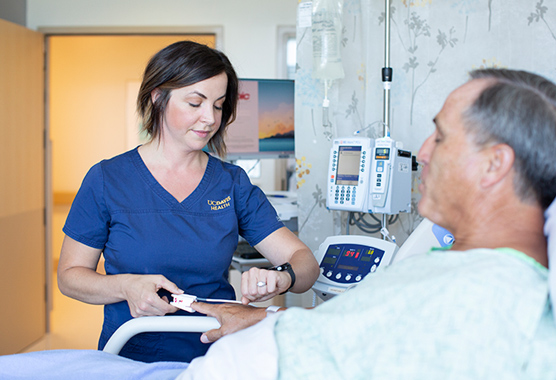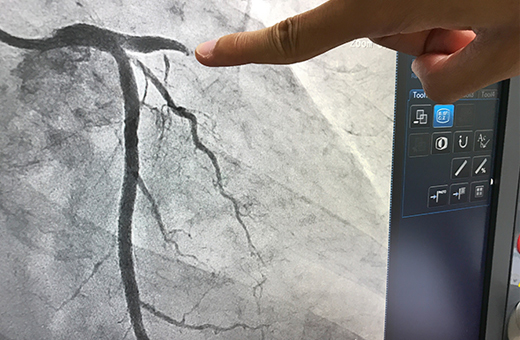Interventional Radiology
UC Davis Health interventional radiologists use minimally invasive procedures to diagnose and treat vascular diseases, cancers and other conditions.
Medically reviewed by Elizabeth Morris, M.D. on Aug. 30, 2023.

Experts in Interventional Radiology
UC Davis Health interventional radiologists diagnose and treat a variety of conditions without the need for invasive surgery. Our providers perform procedures using thin tubes (catheters) or wires threaded through a blood vessel. Different medical imaging techniques guide the procedures.
A subspecialty of the UC Davis Department of Radiology, interventional radiology procedures may help you avoid surgery and hospitalization. You have a faster recovery with fewer risks of complications.
Interventional Radiology Approaches
UC Davis Health interventional radiologists expertly perform all types of complex procedures through blood vessels. This less invasive approach promotes a faster, less painful recovery.
Angiograms (Angiography)
Your provider views an X-ray screen to watch an injectable contrast dye travel through your bloodstream. Angiograms detect blocked and narrowed blood vessels, as well as vein problems like blood clots.
Angioplasty and Stenting
Angioplasty uses a catheter with a deflated balloon device on the tip. Your provider threads the catheter through a blood vessel to reach a blockage. When the balloon inflates, it pushes plaque against the blood vessel walls. Your provider may also place a stent (mesh coil) to keep the blood vessel open.
Embolization
Your provider inserts medications or devices through a catheter to close a blood vessel. Embolization treats aneurysms, uterine fibroids and other conditions that can cause potentially life-threatening bleeding.
Needle Biopsy
Your provider views medical imaging while using a thin needle to remove tissue samples. A lab analyzes the tissue for signs of cancer and other diseases.
Thrombolytic Therapy (Thrombolysis)
This treatment breaks up or removes blood clots that can cause heart attacks and strokes. Your provider uses a catheter to deliver medications that dissolve the clot. Or they may thread tools through the catheter to remove the clot.
Request an Appointment
As Sacramento's No. 1 hospital, you'll benefit from unique advantages in primary care and specialty care. This includes prevention, diagnosis and treatment options from experts in 150 specialties.
Referring Physicians
To refer a patient, submit an electronic referral form or call.
800-4-UCDAVIS
Patients
Call to make an appointment.
Consumer Resource Center
800-2-UCDAVIS
Your care team will review what to expect for your specific interventional radiology procedure. Be sure to follow their instructions to ensure the best outcome.
-

Before Interventional Radiology
Your pre-treatment steps will vary depending on the procedure and underlying condition. You may not be able to eat, drink or take medications before you get interventional radiology.
-

During Interventional Radiology
Our anesthesiologists give you medicine to help you relax or sleep through the procedure. Your interventional radiologist views medical images to perform the procedure.
-

After Interventional Radiology
Depending on the procedure, you may need to stay in bed for several hours and immobilize the leg or arm that had the catheter. You may be able to go home the same day, but someone else must drive.
Home Care
Your at-home recovery after interventional radiology will vary depending on the procedure. It’s important to follow your care team’s instructions.
Take It Easy
Anesthesia can remain in your body for up to 24 hours. Try to rest and don’t overdo it during this time.
Avoid Strenuous Activities
You shouldn’t drive, lift heavy objects or engage in vigorous physical activity until your provider gives the OK.
Stay Hydrated
If your procedure used an injectable contrast dye, be sure to drink lots of water to flush the dye from your system.
When to Contact Your Interventional Radiologist
Call your provider if you experience unusual bleeding, difficulty breathing or signs of infection like redness or swelling at the catheter or needle site.

Ranked among the nation’s best hospitals
A U.S. News & World Report best hospital in cardiology, heart & vascular surgery, diabetes & endocrinology, ENT, geriatrics, neurology & neurosurgery, and pulmonology & lung surgery.

Ranked among the nation’s best children’s hospitals
U.S. News & World Report ranked UC Davis Children’s Hospital among the best in neonatology, nephrology, orthopedics*, pediatric & adolescent behavioral health, and pulmonology & lung surgery. (*Together with Shriners Children’s Northern California)

Ranked Sacramento’s #1 hospital
Ranked Sacramento’s #1 hospital by U.S. News, and high-performing in aortic valve surgery, back surgery (spinal fusion), COPD, colon cancer surgery, diabetes, gynecological cancer surgery, heart arrhythmia, heart failure, kidney failure, leukemia, lymphoma & myeloma, lung cancer surgery, pacemaker implantation, pneumonia, prostate cancer surgery, stroke, TAVR, cancer, orthopedics, gastroenterology & GI surgery, and urology.

The nation’s highest nursing honor
UC Davis Medical Center has received Magnet® recognition, the nation’s highest honor for nursing excellence.

World-class cancer care
One of ~59 U.S. cancer centers designated “comprehensive” by the National Cancer Institute.

A leader in health care equality
For the 13th consecutive year, UC Davis Medical Center has been recognized as an LGBTQ+ Healthcare Equality Leader by the educational arm of America’s largest civil rights organization.
